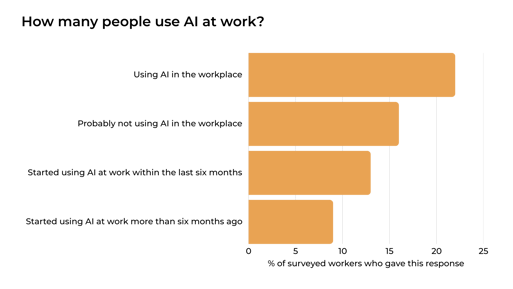What's on this page?
Jump to:
- How is AI Changing the Labour Market in Australia and New Zealand?
- How Many Jobs Will AI Replace in Australia and New Zealand by 2030?
- What Jobs Will AI Create?
- What Jobs Will AI Replace?
- What Jobs Will AI NOT Replace?
- AI is Disrupting the Job Market: How Can You Stay Ahead?
- Final Thoughts: You Decide the Impact of AI on Your Career
- FAQs about AI's Impact on the Job Market
How is AI Changing the Labour Market in Australia and New Zealand?
AI adoption is reshaping the labour markets in Australia and New Zealand, but in different ways. With SBS News recently reporting that 55% of workplace tasks could be performed by people using AI (and another 15% could be entirely replaced), it can be hard to know where your career fits into this new landscape.
In both countries, demand for AI-related skills has grown significantly over the past decade, even as overall job markets have softened in recent years. This suggests that while employers may be posting fewer roles overall, they’re prioritising candidates with AI capabilities.
1. AI skills are in hot demand in both Australia and New Zealand
AI literacy is the most in-demand skill in Australia, according to LinkedIn's Jobs on the Rise 2026 report.
In New Zealand, employers are prepared to offer AI specialists salary premiums averaging 21% above comparable technology roles - it's no wonder, as 45% report having a lack of skilled AI talent.
2. Finance and education are leading the way with AI adoption
In Australia, finance tops the list for AI-focused hiring, with nearly 12% of its job ads asking for these skills, followed by tech and communications at almost 7%.
In New Zealand, finance is also number one at 9.3%, just ahead of education at 9.0%.
3. Jobs most affected by AI are changing the fastest
In Australia, roles most impacted by AI have seen skills requirements shift 88% more than those less affected.
In New Zealand, the gap is smaller at 27%, but it still shows these jobs are evolving and adapting — not simply disappearing.
4. Jobs where AI supports people are growing faster than those it replaces
In Australia, both types of AI roles are on the rise, but jobs where AI helps people work better (up 47%) are edging out those where AI does the work alone (up 45%), with big boosts in agriculture, hospitality, and recreation.
In New Zealand, the gap is wider – AI-assisted roles grew 71% compared to 61% for fully automated ones, led by mining, hospitality, and health.
5. Degrees matter less in Australia's AI-heavy jobs, but they still hold weight in New Zealand
In Australia, the share of AI-focused roles asking for a degree has dropped from 74% in 2019 to 69%, showing a shift toward valuing skills over formal qualifications.
In New Zealand, the opposite trend is happening – degree requirements have edged up to 81%. But the difference between high- and low-AI roles is getting smaller.
---
The key takeaway from all this, in my opinion? Yes, AI skills are increasingly in high demand and seem to be the key to future-proofing your career reliably. On the other hand, no, AI is not simply replacing jobs like for like, it’s supporting people to work more effectively in their roles and changing the skills needed from employees in different fields.
Fact: Adults in Australia and New Zealand are optimistic about AI
One in three (32%) adults in Australia say they're excited to learn about AI - this figure rises to two thirds (62%) of First Nation respondents.
The story is similar is New Zealand, with 31% believing that AI could improve public services and infrastructure.
Notably, Project Managers are leading the way with AI integration in Australia and New Zealand.


How Many Jobs Will AI Replace in Australia and New Zealand by 2030?
Predictions for AI’s impact on jobs in Australia and New Zealand vary, but the evidence points to transformation, not wholesale elimination. In Australia, McKinsey estimates that by 2030, up to 1.3 million workers (around 9% of the workforce) may need to transition into new roles due to automation and generative AI. The most recent Pearson Lost in Translation report has revealed that by 2030, around 65% of the skills needed for existing jobs will have changed, with 26% of jobs being at high risk if people do not upskill and embrace AI.
This is less about jobs “vanishing” and more about roles changing shape, with demand shifting from routine office support, production, and customer service toward technology, healthcare, and professional services.
The technical potential is significant: as much as 62% of current work hours could already be automated with today’s AI, and by 2030 this could rise to 79–98%. However, adoption will be slower in practice. In a midpoint scenario, about one-quarter of work hours could be automated by 2030, accelerating demand for reskilling and new career pathways.
For New Zealand, while no single figure matches Australia’s detailed projection, trends from PwC’s AI Jobs Barometer suggest similar patterns. Higher-exposure sectors such as financial services and education are adopting AI at speed, and roles that rely on routine, predictable tasks are most likely to shrink.
Jobs that combine sector expertise with AI literacy, especially in mining, health, and hospitality, are seeing growth, indicating that augmentation will offset many automation losses.
The takeaway for both countries is clear: AI will reshape the labour market by shifting workers out of lower-growth roles and into emerging, higher-skill opportunities. This doesn’t mean net job loss; if supported by strategic reskilling, the transition could lead to more high-value, better-paid roles across the economy.
What Jobs Will AI Create?
AI is a growth engine for new careers. As more organisations integrate AI into their operations, they need people who can design, manage, interpret, and ethically guide these systems. This means demand is rising for roles that blend technical expertise with strategic thinking, creativity, and human insight.
We’re also seeing entirely new job categories emerge, from AI trainers who fine-tune models to ethics specialists who set guardrails for responsible use. Many of these careers didn’t exist a decade ago, and most will continue evolving as AI technology advances. The result? More opportunities for those willing to adapt, reskill, and step into AI-enabled roles.
- Data Analysts – demand for AI and big data roles up ~30–35% by 2027, adding around 2.6 million global jobs. With AI producing ever more data, analysts are crucial for turning that into insights that drive decisions. The World Economic Forum projects a 30–35 % growth in demand for data analysts and big data specialists by 2027, creating roughly 2.6 million opportunities globally.
- AI/Machine Learning Engineers – 40% growth in job openings by 2027. These engineers design, build, and refine AI systems – everything from language models to predictive tools. The World Economic Forum forecasts a 40 % increase in demand for AI and ML specialists by 2027.
- Cybersecurity Specialists – approximately 3.5 million unfilled roles globally. As AI expands, it creates new security risks, which only skilled cybersecurity experts can manage. Cybersecurity Ventures reports about 3.5 million cybersecurity job openings worldwide, revealing urgent demand.
- AI Trainers & Ethics Officers – emerging roles ensuring AI fairness and safety. Companies rely on these professionals to reduce bias, guide model behaviour, and oversee responsible deployment. New job profiles like “AI ethicist” and related roles are already emerging to meet this need.
- Project Professionals (e.g., Digital Project Managers) – 25 million new project management professionals needed globally by 2030. Managing AI projects demands leaders who understand both tech and strategy. The Project Management Institute estimates 25 million new project professionals will be needed worldwide by 2030 – an average of 2.3 million new roles annually.

Fact: Employers in New Zealand and Australia are paying a wage premium for AI skills
PwC revealed that there is a 56% wage premium for AI skills when comparing workers in the same job with and without AI skills.
Learning AI skills and honing your interpersonal skills in combination, can make you more attractive to employers.

What Jobs Will AI Replace?
While AI is creating new opportunities, it’s also automating or partially automating roles that rely heavily on repetitive, predictable tasks. These jobs tend to have clearly defined processes, low variation, and outcomes that can be replicated by algorithms or software with minimal human oversight.
It’s important to remember that automation doesn’t always mean outright elimination. Many roles will transform rather than vanish. As some tasks are taken over by machines, human workers often move into related positions that require more problem-solving, emotional intelligence, or strategic thinking.
1. Data Entry Clerks
AI-powered data processing can handle vast quantities of information with higher speed and accuracy. Many will shift into data verification or analysis roles that require human judgement.
2. Telemarketers
AI chatbots and automated calling systems can now handle high volumes of sales outreach. Workers may transition into customer success or relationship management roles that focus on deeper engagement.
3. Basic Bookkeepers
Accounting software with AI integration is automating routine ledger work. Bookkeepers are increasingly moving into financial advisory or compliance-focused roles.
4. Proofreaders
Advanced grammar and style-checking tools reduce the need for manual proofreading. Professionals in this field may shift towards content editing or brand voice consultancy.
5. Bank Tellers
Digital banking and AI-driven kiosks are replacing many in-branch transactions. Former tellers are finding roles in financial planning or digital client onboarding.
6. Routine Legal Assistants
AI can now draft contracts, review case law, and organise files. Legal assistants may pivot to paralegal work that involves complex case preparation or client liaison.
---
AI replacing routine work isn’t the end of the story; it’s the start of a reshaping process. The key is moving from roles focused purely on execution to ones where human insight adds value that AI can’t replicate.
What Jobs Will AI NOT Replace?
Some jobs are naturally “AI-proof” because they rely on qualities machines can’t replicate. At least not fully. Roles that require deep empathy, complex physical dexterity, nuanced judgement, or creative vision are far harder to automate. Even where AI tools are introduced, they tend to enhance rather than replace the human touch.
These roles often depend on interpersonal connection, ethical decision-making, or hands-on expertise that can’t be reduced to an algorithm. In most cases, AI will become a supportive tool, freeing up time for the human aspects of the job to shine even more.
1. Nurses and Healthcare Practitioners
Direct patient care requires empathy, adaptability, and trust-building – qualities AI cannot authentically replicate. AI may assist with diagnostics or admin, but not the human bond of care.
2. Teachers and Educators
Learning is as much about mentorship and inspiration as it is about content delivery. AI can support lesson planning, but students still need human role models and guidance.
3. Skilled Tradespeople (e.g., Electricians, Plumbers)
These roles involve unpredictable, hands-on problem-solving in varied environments. AI can’t yet match the adaptability and tactile skills required on the job.
4. Psychologists and Therapists
Emotional intelligence and human connection are central to mental health work. AI chatbots may offer support, but they can’t replace nuanced therapeutic relationships.
5. Creative Directors and Artists
While AI can generate images or music, it lacks cultural context, lived experience, and originality rooted in human perspective. These elements are essential to true creative leadership.
6. Senior Business Leaders
High-level decision-making often involves weighing incomplete information, anticipating human behaviour, and steering organisational culture. These tasks go well beyond AI’s current capabilities.
Jobs like these thrive because they combine technical skill with human connection. In the AI era, the more human your strengths, the more future-proof your career will be.
Fact: Degree requirements in Australia are falling faster for jobs more exposed to AI
PwC's latest report reveals that jobs with high AI exposure in Australia have seen a 5% decline in degree requirements between 2019 and 2024.
Despite degree requirements for AI-exposed jobs rising in New Zealand, occupations which are highly exposed to Generative AI are experiencing a smaller decline in their number of job postings.

AI is Disrupting the Job Market: How Can You Stay Ahead?
AI is changing the skills employers look for, the speed at which roles evolve, and the way work gets done. The people who will benefit most aren’t necessarily those who know the most about AI today, but those who are ready to adapt quickly as it reshapes their industry. Staying ahead means treating learning as a continuous process, not a one-off event.
Whether your role is being transformed, created, or supported by AI, the best protection is to build skills that are relevant, flexible, and future-focused. That could mean combining technical knowledge with creativity, or pairing AI literacy with strong communication and leadership abilities.
Here’s how to stay competitive in an AI-driven market:
-
Learn relevant skills: Gain knowledge in AI, data analysis, cybersecurity, or other high-demand areas connected to your field.
-
Retrain or upskill: Take industry-recognised courses to move into growing roles or strengthen your current position.
-
Adopt a lifelong learning mindset: Make professional development a habit so you’re ready to pivot when new opportunities emerge.
---
By acting now, you’re not just defending your career; you’re actively shaping it for the AI-powered future.
Why AI Skills Matter Now
According to the Australian Government's Department of Industry, Science and Resources, AI hiring has more than tripled since 2015. Likewise, in New Zealand, PwC found a positive correlation between AI occupational exposure and job posting growth.
That means no matter your profession, AI awareness isn’t optional - it’s essential. The world of work is changing fast — and AI is at the heart of that change.
At Learning People, we’re serious about preparing our students to thrive in this new landscape. We embed AI knowledge into our training so you can stand out from the crowd and future-proof your career.
Final Thoughts: You Decide the Impact of AI on Your Career
AI is already reshaping the world of work, changing the skills employers value and creating new opportunities alongside fresh challenges. Some roles will disappear or evolve, while others (many we can’t yet imagine) will emerge. The difference between being disrupted and being ready comes down to preparation.
By understanding where the demand is growing and aligning your skills accordingly, you can position yourself to thrive in the AI era - and January is the perfect time to do just that. If you start studying now, you can be qualified in time for April recruitment drives.
At Learning People, we don’t just offer standalone AI courses; we integrate AI-focused modules into all of our curated learning pathways, such as project management, cyber security, data analytics, and more, ensuring every programme prepares you for the realities of digital-first careers.
Whether you’re starting fresh, switching industries, or future-proofing your current role, our approach gives you the technical know-how, industry insight, and career support to turn AI from a threat into an opportunity.
The future of work is changing fast, so let’s make sure you’re ready for it.
FAQs about AI's Impact on the Job Market
Related Articles
 AI
AIThe Uses and Impact of AI in Project Management
Did you know that Project Management is one of the leading sectors in AI transformation and adoption across the globe? Whether you're looking to start or progress your Project Management career, make sure you understand how AI is being used in project-based roles and how this is impacting the industry.
Read More Corporate & Office Jobs Advice
Corporate & Office Jobs AdviceStarting a New Job: A Guide to Navigating Your First Days and Weeks at a New Workplace
Starting a new job soon? Get clear, practical advice to reduce anxiety, make a strong first impression, and settle into your first weeks with confidence.
Read More Changing Career
Changing CareerHow to Write a Career Change Cover Letter, with Examples
When changing careers, the way you apply for jobs will be different from usual, and this includes how you write your cover letter. As a career advisor, I share some of the advice, tips, and tricks for writing a career change cover letter, as well as an adaptable cover letter template and examples.
Read More AI
AIJobs That Are AI Proof in the Tech Sector: A List for 2026
AI is certainly disrupting the tech sector and job markets across the globe, but there are some roles and skillsets which simply can't be replaced by AI in 2026.
Read More

